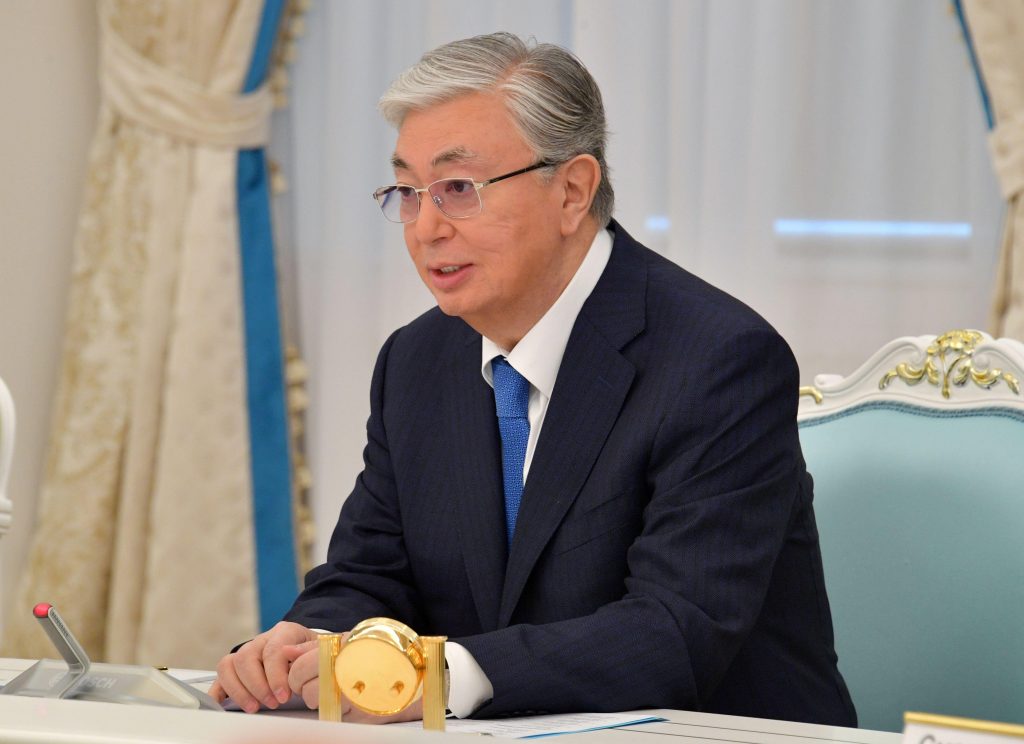NUR-SULTAN
Kazakhstan is moving rapidly and assuredly out of the era associated with its first president, Nursultan Nazarbayev.
And the changes are coming fast, weeks after deadly riots jolted the ex-Soviet state, with key resignations and longstanding institutions undergoing being modified or overturned.
The latest shift occurred last week with the rebranding of the ruling party – previously called Nur Otan (Light of the Fatherland in Kazakh) and inextricably linked to Nazarbayev and now to be known as Amanat, or Legacy of our Ancestors.
This followed hard on the heels of the decision by Nazarbayev’s daughter Dariga, one of the most influential members of the family, to give up her parliamentary seat.
Other major steps in recent days have included the arrest of former Defence Minister Murat Bektanov for his “inaction” in tackling the protests which left at least 227 dead and were quelled after troops from Russia and other ex-Soviet states were drafted in to protect strategic sites. Thousands were arrested.
The unrest was initially triggered by fuel price increases in the west of the country but turned into a mass expression of discontent at discrepancies in living standards between the elite and ordinary workers and perceived nepotism linked to Nazarbayev’s three decades in power.
And Erlan Turgymbayev was removed as Interior Minister after widespread criticism of the brutal police response to the unrest.
New name, new tasks
The rebranding of the ruling party was formally proposed by the speaker of parliament, Erlan Koshanov. But it was President Kassym-Jomart Tokayev who choreographed the formal announcement at a party congress, along with appeals to urgently oversee the running and operations of public institutions.
“The new name portrays the unfading ideals of independence, the values of strong statehood, national unity, the vast expanses of our homeland, which our ancestors bequeathed to us,” Tokayev told the congress.
“We must keep and strengthen this priceless legacy. This is our sacred duty to past and future generations.”
Tokayev set out as a primary task a drive to eliminate bureaucracy in institutions associated with the party.
“The party has a vast number of councils and commissions of all sorts. The same questions get discussed over and over but concrete decisions are rarely adopted,” he said. “It would be good to shift the focus of public discussions from social media and city squares to our parliament and maslihats (local councils).”
Party reform has been under debate for some time in Kazakhstan, but few changes have been introduced.
Tokayev is due to make his annual state of the nation address on 16th March.
During the upheaval in January, protesters derided and mocked Nazarbayev, who stepped down in 2019 and handed power to Tokayev. A monument bearing his bust was torn down outside the country’s largest city, Almaty.
The most striking symbol of the moves to distance the country from its former leader same with Dariga Nazarbayeva’s announcement that she was giving up her parliamentary seat.
Nazarbayeva, once mooted as a successor to Tokayev, said she intended to focus on “social, humanitarian, cultural and charitable activities”.
Breaking her silence and notable public absence after more than a month, she also called for a “thorough and objective investigation” of January’s events, adding “the guilty should be punished fairly and the innocent should be released”.
Tokayev has issued several clear indications of his plans to loosen the Nazarbayev bloc’s wholesale grip on the oil-rich Central Asian nation long-term.
Last month, two of Nazarbayev’s sons-in-law, Dimash Dosanov and Kairat Sharipbaev, resigned from positions within key companies in the country’s oil and gas industry respectively. Meanwhile, state business with Operator ROP, a recycling monopoly linked to Nazarbayev’s youngest daughter, Aliya, was cut off.
Dariga Nazarbeyeva’s decision to leave parliament comes just weeks after her removal from the Political Council Bureau, the ruling party’s highest representative body – part of a series of major political reshuffles and reforms to law enforcement agencies.
In addition to Bektanob’s arrest, a senior official of the National Security Services (KNB), Murat Osipov, was detained. Former KNB boss and Nazarbayev loyalist Kassim Massimov was arrested at the height of the unrest and charged with high treason for “attempting to seize power by force”, along with two other deputies.
The worst of the January violence was reported in Almaty, where 103 deaths occurred and gangs stormed public buildings. Tokayev also issued a widely criticised “shoot-to-kill-without warning” order.
Authorities continue to deny allegations by eyewitnesses that Kazakhstan’s military forces opened fire on civilians. There is continued public scepticism around Tokayev’s unsubstantiated claim that the unrest was orchestrated by 20,000 foreign terrorist
Many of the thousands of protestors arrested during the unrest remain in “temporary pre-trial detention centres” where many of their relatives allege widespread instances of torture.
According to the Prosecutor General’s office, 227 criminal cases have been opened against law enforcement agencies for the torture of detainees and the use of “illegal methods of investigation.” Nine officers of the security forces face charges.
Rights activists have called on Kazakhstan authorities to release the names of all those killed during the riots, while monitors like Human Rights Watch have urged Tokayev’s newly formed government to deliver on its promises for reform and bring to justice those responsible for torture and other abuses.

